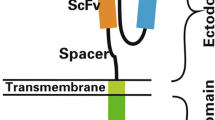Abstract
We have reported that, while immune responses were generated initially against CMS5 tumor cells, they were lost with time. In the present work, we asked whether the tumor cells contributed to this by delivering an inhibitory signal or whether a positive signal, delivered in the form of tumor-derived interleukin-2 (IL-2) or the presence of professional antigen-presenting cells (APC) would be sufficient to enable a sustained response. We observed that the presence of tumor cells did not inhibit the generation of anti-(class I) cytotoxic T lymphocytes (CTL), suggesting that the tumor cells were not directly suppressive. In addition, the lack of a response could not be attributed to insufficient levels of IL-2 alone, since even tumor cells that secreted IL-2 failed to stimulate anti-(class I) CTL. Finally, we observed that professional APC were necessary to deliver an essential signal, but only in the presence of IL-2-secreting tumor cells. Thus, CMS5 cells failed to provide essential signals necessary for CTL generation, but were not directly suppressive.
Similar content being viewed by others
Author information
Authors and Affiliations
Additional information
Received: 18 November 1998 / Accepted: 27 April 1999
Rights and permissions
About this article
Cite this article
Zier, K., Salvadori, S. Generation of anti-allogeneic cytotoxic T lymphocytes depends upon a signal, not delivered by tumor cells, that can be provided in trans in the presence of exogenous interleukin-2. Cancer Immunol Immunother 48, 247–252 (1999). https://doi.org/10.1007/s002620050572
Issue Date:
DOI: https://doi.org/10.1007/s002620050572




